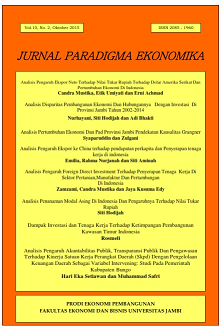Faktor-faktor yang mempengaruhi tingkat fertilitas di perdesaan (Studi pada Desa Pelayangan Kecamatan Muara Tembesi Kabupaten Batanghari)
DOI:
https://doi.org/10.22437/paradigma.v12i1.3933Abstract
This study aims to analyze the factors that affect fertility in rural areas by taking the case of Pelayangan Village, Muara Tembesi District, Batanghari Regency. The study used a survey method with a sample of women of childbearing age in the study village. The analytical tool used is path analysis. The results of the analysis found that simultaneously women's education, family income and age at first marriage had a significant effect on fertility. Partially based on path analysis shows that a) The age of first marriage has a significant negative effect on fertility. The higher the age at first marriage, the lower the fertility rate; b) Women's education has a significant negative effect on fertility both directly and indirectly through the age of first marriage; c) Income does not have a significant effect on fertility either directly or indirectly through the age of first marriage.
Downloads
Downloads
Published
Versions
- 2017-06-30 (1)
- 2017-06-30 (1)









